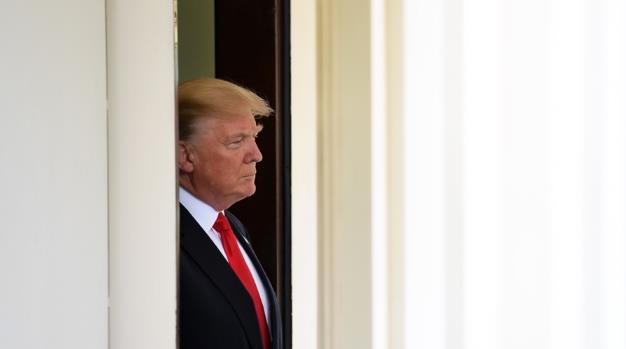US withdrawal from Paris Climate Accord — What it will mean
- By Eugene Clark
 0 Comment(s)
0 Comment(s) Print
Print E-mail China.org.cn, June 2, 2017
E-mail China.org.cn, June 2, 2017
|
|
|
U.S. President Donald Trump awaits the arrival of Vietnamese Prime Minister Nguyen Xuan Phuc at the White House in Washington D.C., the United States, on May 31, 2017. [Photo/Xinhua] |
President Trump has this morning declared the withdrawal of the US from the Paris Climate Accord signed by 195 countries last November. This is based in part on his campaign pledge to withdraw from or renegotiate the accord. In his presidential campaign, Trump indicated that the US agreement to the treaty was a mistake as was the Trans-Pacific Partnership.
Given the strong leadership role exerted by China and the US to bring about the Paris Climate Agreement, such a move by the US to withdraw is highly regrettable. There is almost no chance to meet the Climate Agreement's aggressive carbon emission targets without the leadership of the US and China.
Many countries only reluctantly signed the accord and were largely persuaded to do so because the world's two largest economies -- China as a developing country and the US as the leading developed country -- were able to build a bridge of cooperation that persuaded all but Syria and Nicaragua to come on board.
The Climate Agreement was an important first step in getting almost every country in the world to address what the vast majority of scientists argue is a serious threat to the whole planet. President Obama executed the agreement in 2015, pledging to cut US greenhouse gas emissions by 26 to 28 percent below 2005 levels by 2025 and committed up to $3 billion in aid for poorer countries by 2020 to assist them in reducing greenhouse emissions.
However, unlike its predecessor, the Kyoto Protocol, the Paris Climate Accord has no means of enforcement and was not a "treaty" in the legal sense of the word but only an executive agreement. While a US President may sign an "Executive Agreement," such agreements can be short-term because they can be undone by a subsequent president.
In contrast to the short-term executive agreements, a treaty power under the US Constitution resides in the Senate: "[The President] shall have power, by and with the advice and consent of the Senate, to make treaties, provided two thirds of the Senators present concur."
As a practical matter it must also be realized that under section 28 of the Paris Agreement it may take two or more years to become effective by which time there may be a new US President.
While the world is likely to be worse off with the US withdrawal, there is a strategic opportunity for China. At the very time that the US, through President Trump's populist policies, seems to be seeking a policy of isolationism with the US going its own and unpredictable way, China has reiterated and strengthened its commitment to globalization and internationalization.
A compelling example of this commitment is the "One Belt-One Road Initiative." The US withdrawal from the Paris Climate Accord will encourage the EU and other countries to look increasingly to Asia and China. The US withdrawal would most certainly weaken the global influence of the US government which will be seen as unpredictable, unreliable, and unstable.
Ironically, the withdrawal by the US from the Paris Climate Accord is also out of step with most Fortune 500 companies and businesses generally which have invested heavily (over a trillion dollars) in renewable and alternative energy. Such a move by Washington is even out of step with many of the US own leading states and localities which are increasingly going green in addition to being committed to improving traditional fossil fuel energy production.
For example, in oil and gas rich Texas, renewable energy industries now employ more people than the oil and gas industry; and the largest state, California, with an economy larger than Russia's, is moving rapidly to develop its renewable energy industries. According to the National Solar Jobs Census 2016, jobs in the solar energy sector grew almost 25% last year while coal and fossil fuel energy sectors struggled.
The emergent energy self-sufficiency of the US over the last decade has also been a major factor in many businesses returning to the US whereas an isolated and withdrawn US is only likely to make it less attractive to foreign investment.
It is good to learn that many major countries, for example the EU, Australia, Canada, have indicated that a US withdrawal from the Paris Agreement would have no impact upon them and that they would continue to honor the agreement as it was signed.
The result of the US withdrawal from the Paris Climate Accord is that the US could be left behind as the EU, China and most of the remaining world goes forward to develop the infrastructure that will realize the dream of cheap, renewable energy.
In our increasingly connected world, we have to have dialogues and work together to solve problems that impact all countries. That process can only succeed if all the major parties participate and remain at the world table.
Eugene Clark is a columnist with China.org.cn. For more information please visit:
http://www.china.org.cn/opinion/eugeneclark.htm
Opinion articles reflect the views of their authors only, not necessarily those of China.org.cn.







Go to Forum >>0 Comment(s)